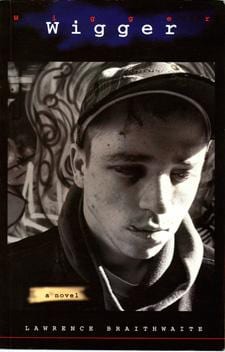In each issue of Xtra, a prominent literary Canadian recommends a queer-authored book. In this installment, poet Ian Young recommends Lawrence Ytzhak Braithwaite’s Wigger.
***
“There was something gorgeous about Andrew. He had the face of a repeatedly defeated boxer and the walk of a lazy metronome. Andrew was tall and always wore a flight jacket, his head bobbing this way and the other. He let Jerry photograph him on two occasions, but still paid little mind to him in public…. Andrew would allow him, after having a hand placed on his shoulder and something whispered in his ear, to take photos of him and touch him naked.”
That’s the opening of Lawrence Braithwaite’s debut 1995 novel, Wigger, which is really a collection of connected short stories. It soon hots up.
“I should turn you over and f-ck fifty bucks up your ass.”
Wigger (a term for a white guy who acts black) is a fractured chronicle of 24 hours in the lives of a disparate (and desperate) bunch of violent, sexual, drug-taking urban youths. The book’s apparently scatter-gun approach combines a keen eye and a fresh way with metaphor: a drag queen opening her purse is “like Tarzan breaking the jaws of a crocodile.”
“Anti-romantic,” says Arsenal Pulp Press’s cover blurb, which is putting it mildly. Novelist Kevin Killian said he hadn’t been so excited about — or frightened by — a new writer in many years.
The author of this unprecedented foray into narrative mayhem was Lawrence Ytzhak Braithwaite, a 32-year-old queer, black, ex-army guy on permanent disability, living in, of all places, Victoria, BC. He broke into print in Dennis Denisoff’s anthology Queeries: An Anthology of Gay Male Prose, seeming to come out of nowhere to create some of the most daring experimental writing in Canada, a mixture of profanity, street slang, song lyrics, dub poetry, porn (gay and straight) and typographical tricks that masked a ferocious intellect.
Braithwaite was by all accounts a difficult customer. A little guy with a patch over one eye (“Lord Patch” was one of his nicknames), he could be disruptive, abusive and annoying, all the while quoting Joyce and Kafka and speaking in “complete paragraphs — with footnotes.” Unfortunately, his drug-fuelled paranoia got in the way of his life. One friend said he had “problems with just about everybody.” This included literary contacts, a violent ex-boyfriend and various drug dealers.
In spite of the difficulties of both Braithwaite and his prose style, he published in several anthologies and gained the respect and friendship of various writers, particularly those associated with the San Francisco-based New Narrative school. Poet Dennis Cooper described his writing as “gorgeous, propulsive,” seeming to “reinvent fiction before your eyes.”
Two later books, Speed, Thrash, Death: Alamo, BC (1998) and Ratz Are Nice (PSP) (2000), show no falling-off of abilities. Some of the dialogue in Ratz Are Nice (PSP) gives the effect of being shouted over loud music — not an easy trick to pull off. The cover photo shows the author in a combative stance, holding a walking stick and accompanied by a skinhead and some other tough-looking characters.
For all his talent and originality, Braithwaite was obviously a troubled soul. His life on the margins (one acquaintance called him a “fringe-dweller”) came to an abrupt end in July 2008 when he was found hanged in his Victoria apartment — a murder victim or a suicide.
Canada has produced too few wholly original talents and certainly none remotely like Lawrence Braithwaite. I found my copy of Wigger at a lawn sale for 25 cents. If you come across one, don’t let it get away.

 Why you can trust Xtra
Why you can trust Xtra


